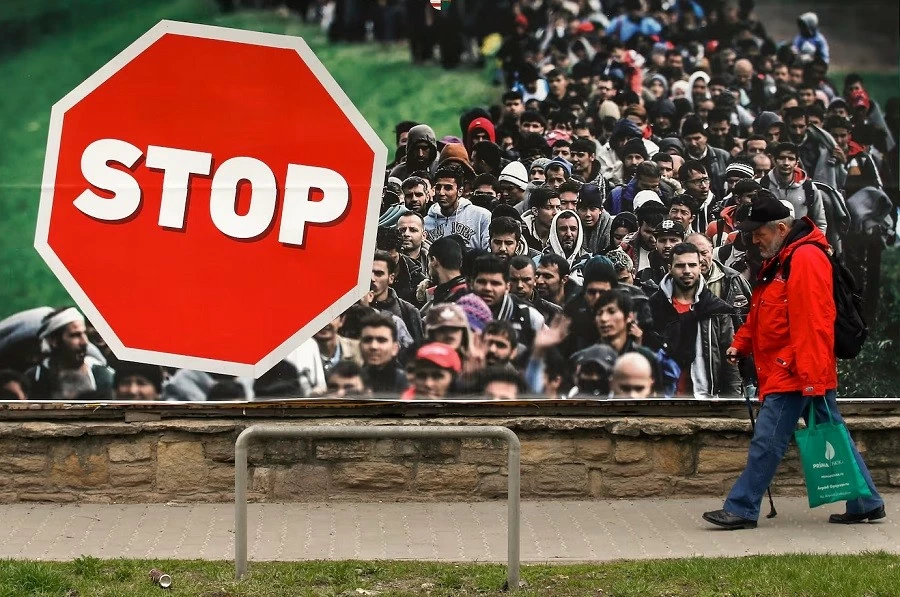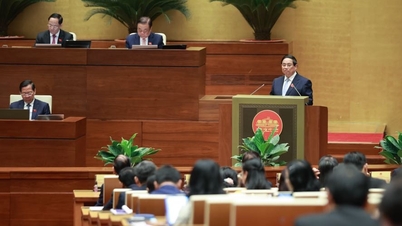On August 22, Hungary reiterated its firm opposition to the European Union (EU) migration pact, which includes a provision imposing migrant quotas on member states.
 |
| Hungarian Prime Minister Viktor Orbán's government has taken a hard line on migrants. (Source: AP) |
Euronews television network quoted Hungarian Prime Minister's Chief of Staff Gergely Gulyas as saying that Budapest is ready to send migrants trying to enter the European Union (EU) to Brussels (Belgium), the bloc's headquarters, in response to a hefty fine of 200 million euros ($216 million) imposed by the European Court of Justice (ECJ).
“If the EU wants migrants, they will get them,” he declared. “We will give all migrants a one-way ticket to Brussels if the union fails to stop migration at its external borders.”
According to Hungarian officials, Budapest remains committed to maintaining sovereignty and control over Hungary's national policies, including on migration.
In June, the ECJ ordered Hungary to pay a 200 million euro fine for “serious violations” of the bloc’s migration rules. In a statement, the ECJ said the EU would also order Hungary to pay a 1 million euro fine for each day of delay for “failing to comply with the Court’s judgment.”
According to the ECJ, Hungary's non-compliance policy “constitutes an unprecedented and extremely serious violation of EU law”.
In the immediate aftermath of the ECJ ruling, Hungarian Prime Minister Viktor Orbán described the decision as "absurd and unacceptable".
Regarding the migration situation, on the same day, the British Home Office announced data recording that between July 2023 and the end of June 2024, the country granted asylum to 67,978 migrants, a three-fold increase compared to 21,436 cases a year earlier.
This is a record number since records began nearly 40 years ago and is higher than during the refugee crisis in the early 2000s. However, by the end of June 2024, the number of asylum applications had fallen by nearly a third, from 175,457 a year ago to 118,882.
During the same period, the number of migrants granted British citizenship reached its highest level in more than 50 years, with around 246,488 people, an increase of 37% compared to the same period in 2023 and 10 times higher than the 23,146 cases in 1962 - the time when the British government began to file citizenship applications for migrants.
The most common non-EU nationals granted British citizenship are Indians (22,263), Pakistanis (19,491) and Nigerians (10,905). However, this only accounts for 28% of all non-EU nationals granted British citizenship because migrants to the UK come from a wide range of nationalities.
Italy was the EU member state with the most citizens granted British citizenship during the period covered by the survey, with 13,188, followed by Romania (7,675) and Poland (7,008).
Source: https://baoquocte.vn/van-de-di-cu-hungary-doa-ra-chieu-hiem-de-tra-dua-don-nang-cua-eu-anh-ghi-nhan-con-so-nguoi-ti-nan-khong-lo-283582.html





![[Photo] Vietnam and Sri Lanka sign cooperation agreements in many important fields](https://vphoto.vietnam.vn/thumb/1200x675/vietnam/resource/IMAGE/2025/5/5/9d5c9d2cb45e413c91a4b4067947b8c8)



























![[Photo] President Luong Cuong and Sri Lankan President Anura Kumara Dissanayaka visit President Ho Chi Minh relic site](https://vphoto.vietnam.vn/thumb/1200x675/vietnam/resource/IMAGE/2025/5/5/0ff75a6ffec545cf8f9538e2c1f7f87a)

































![[Photo] President Luong Cuong presided over the welcoming ceremony and held talks with Sri Lankan President Anura Kumara Dissanayaka](https://vphoto.vietnam.vn/thumb/402x226/vietnam/resource/IMAGE/2025/5/5/351b51d72a67458dbd73485caefb7dfb)
































Comment (0)